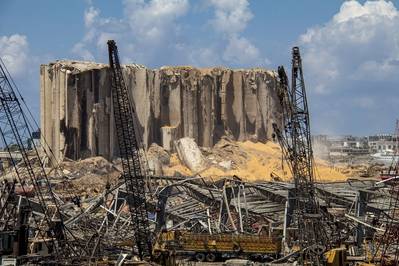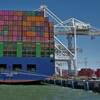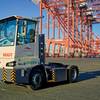Beirut Blast Chemicals Possibly Linked to Syrian Businessmen
The company that bought the ammonium nitrate which exploded in Beirut last August had possible links to two Syrian businessmen under U.S. sanctions for ties to President Bashar al-Assad, according to a report by a Lebanese journalist and London company filings.
Savaro Ltd, the trading firm which procured the chemicals in 2013, shared a London address with companies linked to George Haswani and Imad Khoury, according to the report by documentary film-maker Firas Hatoum, which aired on Lebanon’s al-Jadeed TV station this week.
Haswani, Khoury and his brother Mudalal Khoury have all been sanctioned by Washington for supporting Assad’s war effort. All three are joint Syrian-Russian nationals, according to the U.S. sanctions list and a database that gathers data from official Russian institutions.
The U.S. Treasury accused Mudalal Khoury in 2015 of “an attempted procurement of ammonium nitrate in late 2013”. It sanctioned his brother Imad a year later for engaging in business activities with Mudalal. Haswani was sanctioned in 2015 on charges of helping Assad’s government to buy oil from Islamic State militants, which he has denied.
In reviewing filings with Companies House, the UK’s companies registry, Reuters found that Savaro and Hesco Engineering and Construction Company Ltd, a firm subject to U.S. sanctions for its links to Haswani, both moved their corporate registers -- official company records -- to the same London address on June 25, 2011.
That address was also the registered office for IK Petroleum Industrial Company Ltd, in which Imad Khoury was a director, the filings show.
Dozens of companies can share listed addresses and such links do not necessarily prove company owners are connected. But it is rare for firms to move their registers, particularly to the same address on the same day, according to a Reuters review of filings by hundreds of companies.
Reuters located the agent which had helped register Hesco, but it did not respond to attempts to seek comment about Hesco’s relationship with Savaro. Reuters could not determine if Haswani controlled Savaro, which might have provided a possible indication of his involvement in the procurement of the ammonium nitrate which exploded in Beirut.
Imad Khoury denied links to Savaro. “There is a registrar in London, many companies are registered by it, not just mine,” he told Reuters. “I don’t know this Savaro.”
Mudalal Khoury said there was “no logic” behind laying blame for the Beirut explosion on a company registered at a London address where many others are also registered.
Reuters could not reach Haswani for comment. His son told Reuters in Moscow that his father was unlikely to comment on allegations of links to the chemicals because they are “total nonsense”.
Call for investigation
The findings about the possible links between Savaro and the Syrian businessmen have raised questions among some in Beirut over whether the ammonium nitrate, which is used for fertilizer but also explosives, may have been destined for Syria.
“We want this to be investigated,” Youssef Lahoud, a lawyer who represents around 1,400 victims of the blast, told Reuters.
“It may lead us nowhere or it may be the thread that unravels but we must follow up.”
Lebanese Justice Minister Marie Claude Najm told Reuters the report should be investigated, as with any other allegations related to the ongoing probe into the blast, which is in the hands of the investigating judge and is confidential.
The Companies House register identifies a Cypriot national, Marina Psyllou, as director and majority owner of Savaro since 2016. Psyllou told Reuters in an email on Friday that she does not manage or own Savaro. She did not respond to questions about Haswani.
The Beirut blast killed 200 people, injured thousands and destroyed entire neighborhoods. Officials have said the chemicals went up in flames after being stored at the port in poor conditions for years.
The ammonium nitrate was loaded onto a ship called the Rhosus in Georgia, shipping records show, before making an unscheduled stop in Lebanon in late 2013. It never left, becoming tangled in a legal dispute. The Mozambican firm that ordered the nitrate, FEM, has said it ordered the shipment through Savaro Ltd.
(Editing by Dominic Evans and Nick Tattersall)













